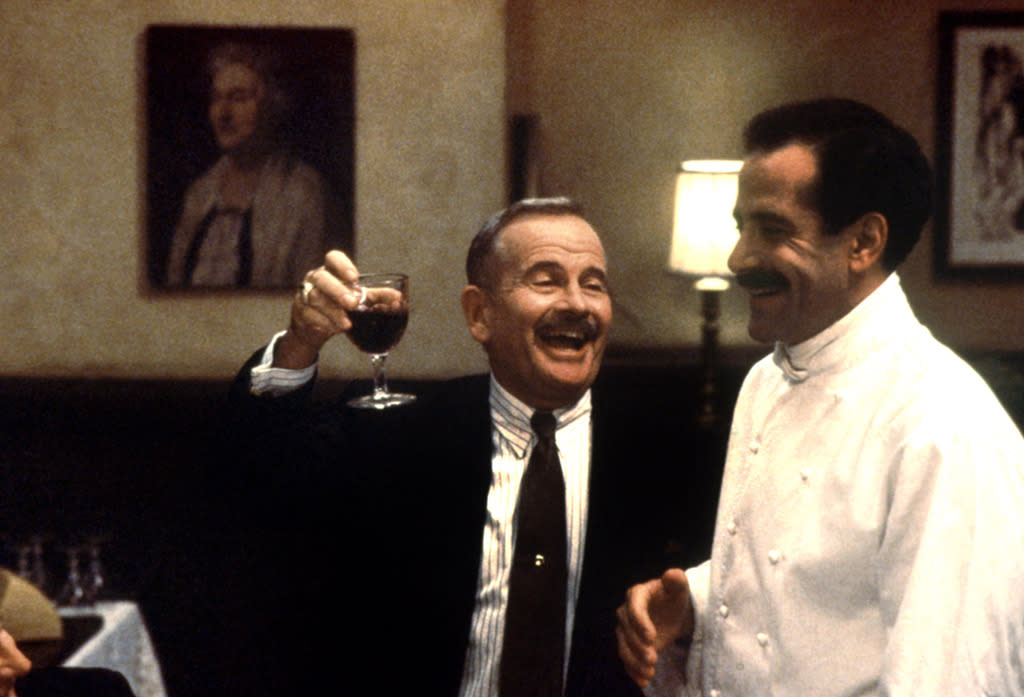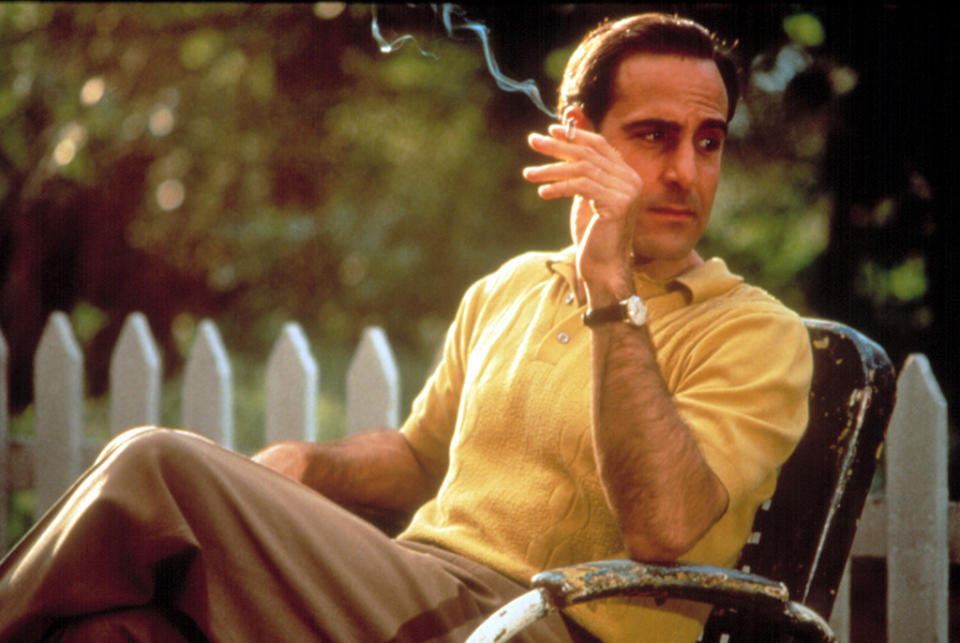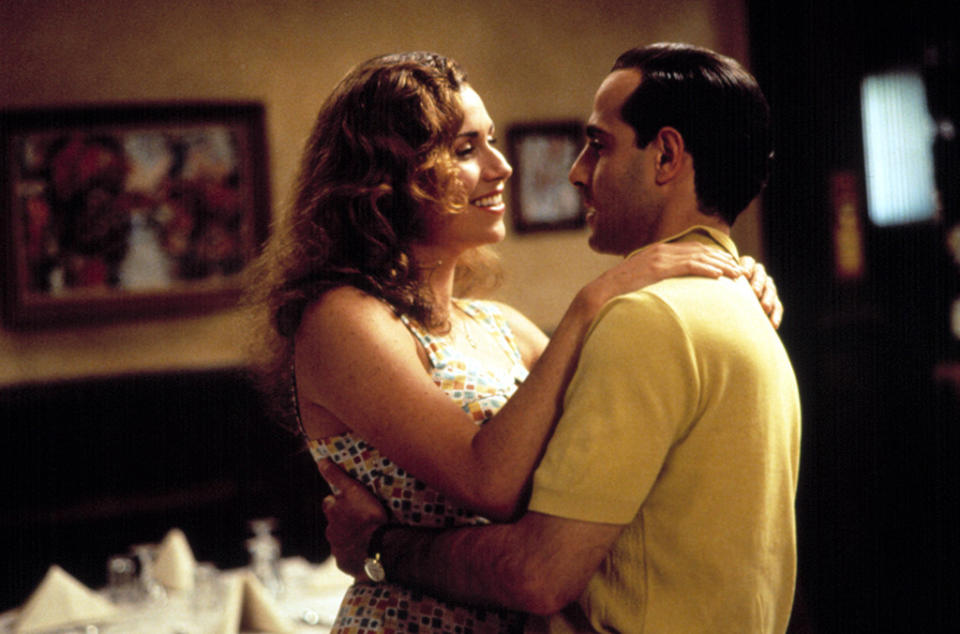Raising Our Glass to 'Big Night,' One of the Most Delicious Foodie Films Ever

Ian Holm and Tony Shalhoub in ‘Big Night’ (Everett)
Friday sees Bradley Cooper donning chef’s whites to star in Burnt, a drama about a bad-boy culinary star who’s attempting a comeback after a spectacular flameout. It’s just the latest example of Hollywood’s love of restaurants and cooking, with Chef and Julie & Julia among the more recent hits. Most of those movies though, are mere appetizers when compared to perhaps the greatest foodie film ever: Stanley Tucci and Campbell Scott’s delectable 1996 comedy-drama Big Night.
Now known best as a co-star in The Hunger Games and Transformers, Tucci was a character actor on the rise in the mid-1990s. He was a familiar face to viewers after playing villains in films as diverse as The Pelican Brief and Beethoven, but he was clearly hungry for something more. “Acting can be frustrating at times,” the star told an audience at the Dublin Film Festival, “so I started to write, with my cousin [Joseph Tropiano], a screenplay. It took us a long time, six to eight years on and off, because I had to go work, and every time I was questioning if I was doing the right thing.”
Related: Real-life New York Chefs Dish on What Works — and What Doesn’t — in Foodie Movies
Originally intended as a play, the script tells the story of a chef named Primo (Tony Shalhoub) and his manager Secondo (Tucci), two Italian brothers in the 1950s who have moved to New Jersey to open a restaurant serving authentic cuisine from their homeland. But despite Secondo’s hustling, Primo’s refusal to compromise with American tastes has caused them to struggle, especially when faced with competition from the more bastardized cuisine served across the street by shameless rival Pascal (Ian Holm).
Watch the trailer:
The brothers’ restaurant, Paradise, is on its last financial legs, and Secondo’s life is further complicated romantically. His girlfriend Phyllis (Minnie Driver) wants him to marry her, but he’s secretly having an affair with Pascal’s wife Gabriella (Isabella Rossellini). Secondo and Primo get one final chance, however, when Pascal offers to invite his friend, jazz singer Louis Prima, to Paradise, and the brothers start planning a blowout banquet that could keep their doors open.
Tucci made the movie in part to offer a different view of the Italian-American experience. “I wanted to tell that story without the Mafia being involved,” he told The Guardian. “I grew up in that community. I never met anyone in the Mafia.” Tucci co-directed with fellow actor and high school friend Campbell Scott on a budget of just $4 million, filling the cast with theater-world friends like Allison Janney, and up-and-comers like Driver (in her first American role) and singing sensation Marc Anthony, who has a charming, near-wordless role as a waiter.

Stanley Tucci in ‘Big Night’ (Everett)
Big Night is a gentle, quiet movie, one that shows its stage origins by carefully rolling out its dramatic revelations, making every speaking role a gem, and putting the performances front and center. But Tucci and Scott don’t make it feel stagey, thanks to some smart composition and an energetic, jazzy period soundtrack. More than most films of this subgenre, you can practically smell the food coming off the screen, from a seafood risotto in the opening, to the banquet of porchetta and timpano (a show-stopping pasta-pie dish), to the simple peace-offering omelet cooked expertly by Secondo in the movie’s touching final scene.
It’s not just food porn, though. Tucci and Scott made a film about art, about the commercial pressures to compromise, about being ahead of your time, and about the sacrifices artists are compelled to make. (“If I sacrifice my work, I die,” Primo says at one point.) Big Night is almost a metaphor for filmmaking: Primo as the brilliant, principled auteur; Secondo as his frustrated, harassed producer; Pascal as the sellout, raking in the big bucks with a mediocre, crowd-pleasing product.

Minnie Driver and Stanley Tucci in ‘Big Night’ (Everett)
It’s also a great film about the immigrant experience and the way that other cultures have helped to inform America, even if there was resistance at first. (“If you give people time, they learn,” Secondo tries to reassure his brother.) And in pitting Primo, who longs for home, against his striving, ambitious younger brother, it also becomes a great film about the American dream — and a rare movie that successfully tackles its flip side, failure. A lesser film would have ended with a last-minute Hail Mary, but Tucci and Scott don’t allow an easy resolution, leaving the story on a note of beautiful ambiguity.
Big Night was a modest success after its release in September 1996. It made a decent $12 million at the box office, and Scott, Tucci, and co-screenwriter Tropiano won great reviews and awards from the New York Film Critics Circle and Film Independent, among others. But it still remains a cult film and a well-kept secret among foodie film fans. Maybe that’s how we want it: Like all the best neighborhood joints, there’s a part of you that wants to keep it to yourself, which is what makes Big Night special, every time you go back to it.
Watch ‘Burnt’ stars Bradley Cooper and Sienna Miller talk about the best meals they’ve ever had:

